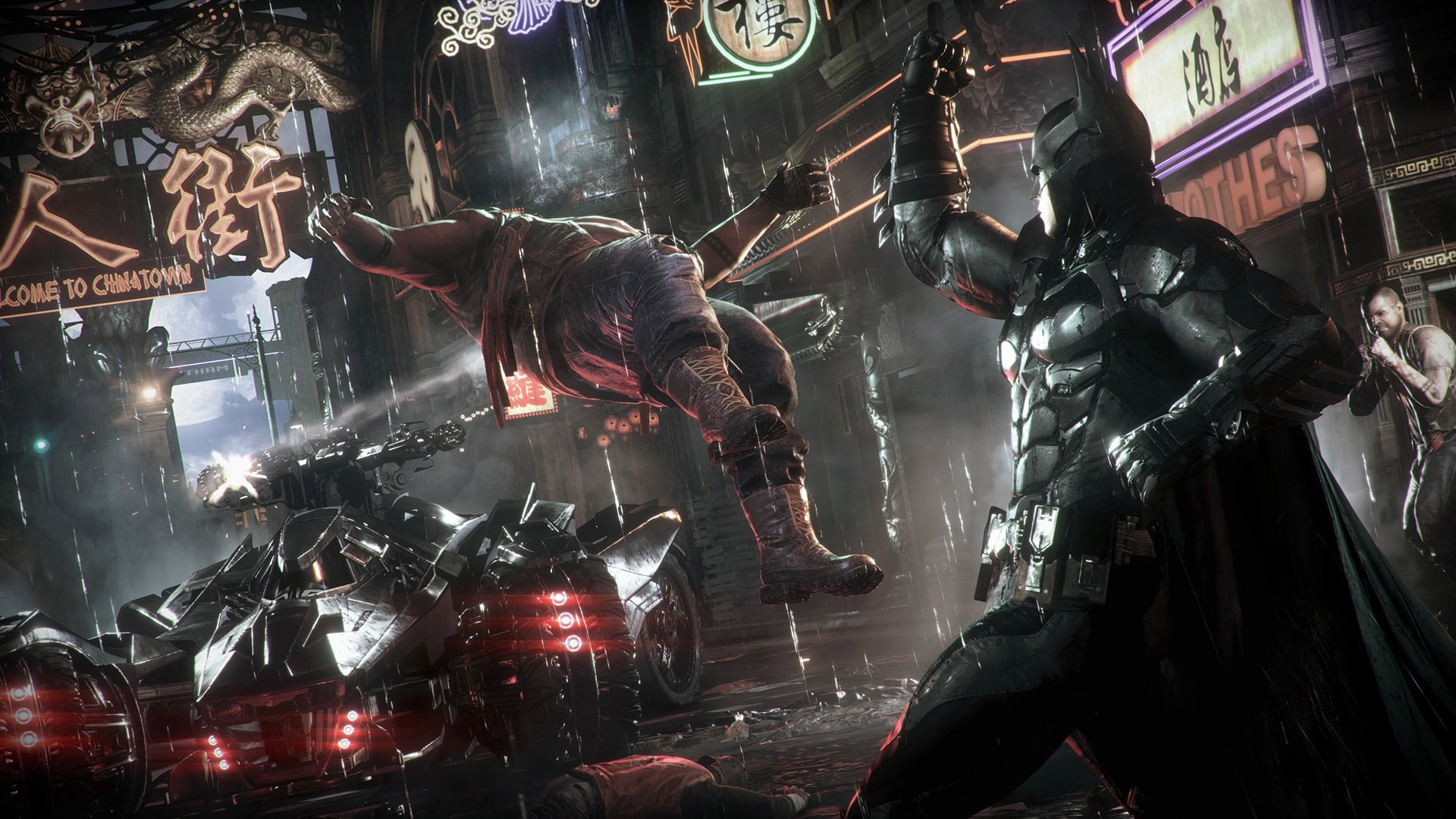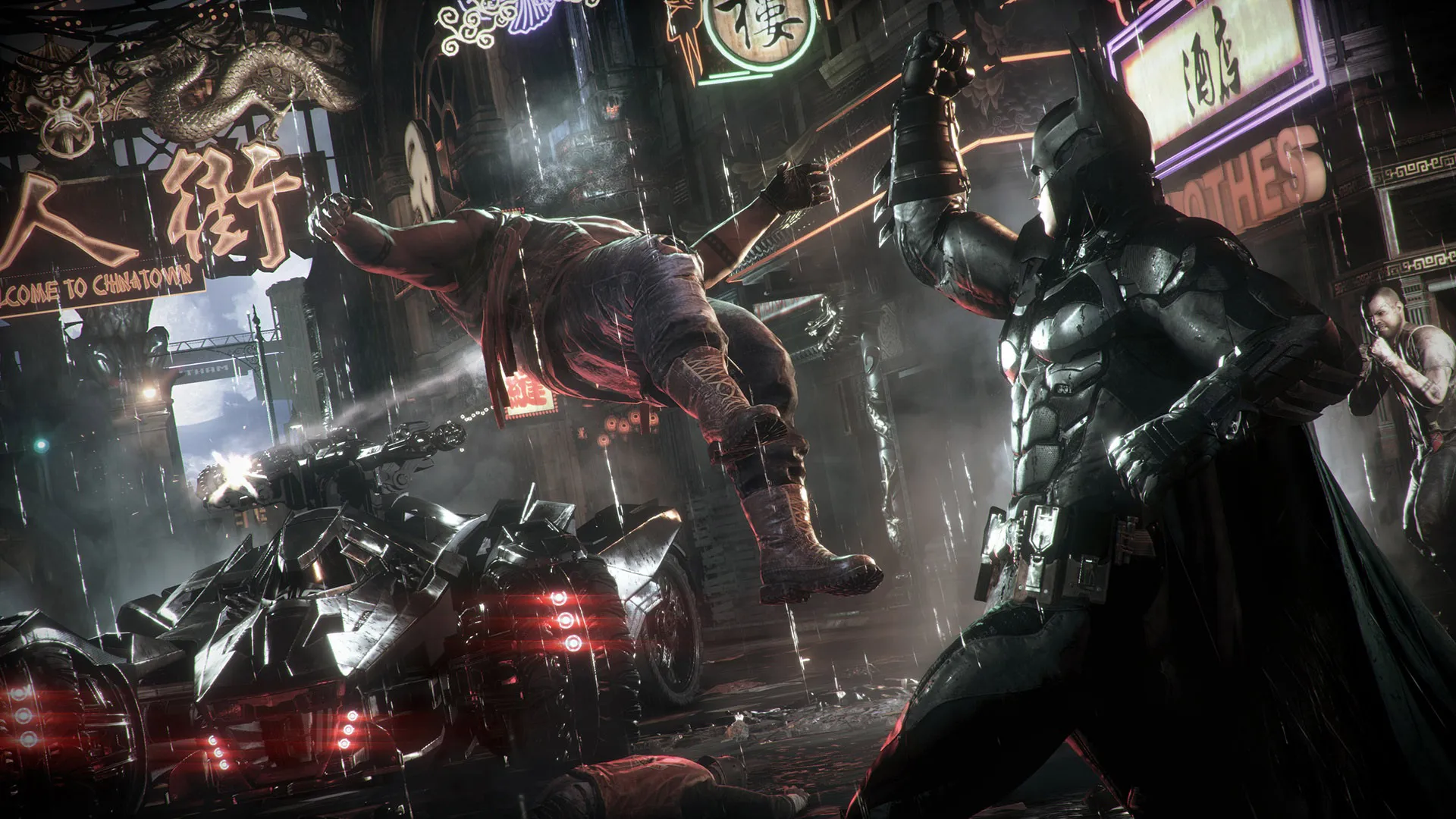Long Halloween
[Note: This review is based on a retail PlayStation 4 copy of Batman: Arkham Knight, not the PC version that is so broken publisher Warner Bros. temporarily delisted it from sale]
If the difference between the real Batman and a pretender is that he’s not wearing hockey pads, what does that mean for a padded out Batman game? If the real Batman doesn’t kill, what does that mean for a Batman game that insists on putting him in a literal tank, often to kill 30 other tanks at a time? Unmanned, mind. The word “drone” is thrown around so much not because of its current cultural position, but to keep reminding that Batman is not killing. It just feels like it.
So much of Arkham Knight is written around the problem of blending Batman with an open world. Gotham is emptied of 6.3 million civilians. Only thugs, villains, and cops remain. The Batmobile, which transforms into a tank, electrocutes anyone it hits at breakneck speeds away from the car. They don’t die, nor do drivers in the vehicles Batman t-bones. I get it, it’s tough working around “no kill” lore in an open world, but you’re adding to your own problems at this point.
The first-person introduction — after a wonderfully moody Joker cremation to remind you he’s definitely dead, yep — where a cop mills about a heavily detailed diner eavesdropping on citizen chatter reminds you how much humanity is squeezed out of the Arkham series in favor of Bats versus criminals in increasingly bombastic scenarios.

Batman: Arkham Knight (PC, Xbox One, PS4 [reviewed])
Developer: Rocksteady
Publisher: Warner Bros.
MSRP: $59.99
Released: June 23, 2015
Arkham Knight is stitched together with exceptional technical proficiency at the cost of tonal instability. City shared this problem. It insists on the direness of the narrative while letting you busy yourself with 69 (hah) AR challenges. It’s worse in Knight, with even more dire stakes (there is nothing to do but escalate, of course) as Scarecrow intends to ruin all of Gotham with the help of the titular Arkham Knight.
There is so much “content” beside the main story path, but most of it is busy work. I’ve still not rescued all 20 captive firefighters spread throughout the city. Militia members set up dozens of roadblocks across Gotham’s three islands that impede the Batmobile, but you can always go around them, or avoid driving except when mandated, given that Batman’s grapple and glide are some of the coolest traversal methods in games. Clearing them isn’t even that useful. It’s just about getting to the super villain (most of whom have no story aside from “they’re doing crime”) at the end and notching the completion percentage.
And of course this brings us to the Batmobile. It is cool and god awful. Calling it to pick Batman up; ejecting from it at high speeds and doing takedowns; the fact that all of Gotham’s pillars and corners are destructible, so you typically don’t do much crashing; remote control driving it towards Batman, who automatically jumps into it while you maintain control and momentum; the tank mode convincing me I need a Transformers game or Armored Core reboot.
This all works well. It was also a lot of work for Rocksteady. Thus, there are heavy, mandated Batmobile segments, like the aforementioned waves of tank fights, and even a hilarious tank stealth section against bigger, stronger tanks.
The Batmobile is cool as something I might occasionally use, but all the work that went into it means it needs a lot of screen time. It’s actually pretty fun to chase Firefly through the streets in it, even if you have to do that several times before he’s been punched enough to quit. When I’m forced to ferry passengers to the police station in it just so more drones can be thrown my way, it becomes a nuisance. When one side mission involves chasing missile-spongy armored cars while smaller armored cars attack me, over and over, it’s not so fun.
Everything is strung together nobly, but it’s a case if “they were so concerned with whether or not they could, they didn’t stop to think if they should.” Disjointed content put together as well as possible mirrors a main story that works too hard to put Batman in his car. The shorter side missions that pop up woven into the narrative are much more fulfilling than saving 20 different firemen, stopping Two Face’s goons from robbing several banks or destroying five or so of Penguin’s weapons stashes (though the latter teams Bats with Nightwing and the dual fighter segments are fun).
Thankfully I hardly looked at the map screen this time around because there’s a d-pad button just to bring up a mission select wheel so it’s easy to ping pong between waypoints like an errand boy. I also hardly looked at the upgrades, usually going several hours at a time before dumping like 50 points into skills I mostly didn’t use (but do reinforce that car for the mandated tank segments).

I can’t tell if there is less punching this time around. Maybe it’s been replaced by Batmobile segments. There are also more stealth options, including fear takedowns that can be used to instantly incapacitate up to eight enemies at a time (ok, upgrades are sometimes helpful, as it starts at three). I can string together perfect, room-clearing 60x combo fisticuffs with the best of them, but combat never drags in Arkham Knight, which I appreciate because my favorite thing to do is to explore the city.
That does bring up a series-long issue of detective mode and waypoints guiding you to the point of feeling like a middle manager. It’s nice to just notice side missions — hearing strange shrieks, hearing opera blaring over a PA system, seeing a building on fire — rather than being directed towards them, but that’s the problem with dealing with this size of open world necessitated by the series trending upward as far as stakes raising goes.
But when you stumble on mutilated bodies and every time — five times! — the answer is to scan one obvious thing on each of three layers (skin, muscle, bone) with detective mode, you’re not really doing anything, much less detecting.

Batman is boring, right? The character. Sad about parents, righteous, rich, mostly ideal. When comic fans point to his spot at the top of the echelon it’s always about the supporting cast (villains, namely). And so, post Joker, what is there to do? Two things, neither of them original, but one of them done well. Without getting too spoilery, the Joker has inevitably left his mark in the Arkham universe and these ramifications are handled nicely in one half of Arkham Knight, even if they open the door for perhaps the most unoriginal and obvious Batman story to take seed beneath Scarecrow’s reign of terror in the other.
Scarecrow, to Rocksteady’s credit, plays a great villain here, though he does so from the shadows. Because Batman is Batman, it’s hard to feel the stakes sometimes, but Scarecrow is good for manipulating Bats and leaving him one step behind, more and more panicked and fragmented. The Arkham Knight, meanwhile, mostly tries to kill you with very large vehicles. The whole tenor of the character feels at odds with his Scarecrow partnership.
There’s the weird red tactical camo print and his general, impotent rage. His voice, which seems to waver beneath the autotune, is a mix of haughtiness and incredulity. He hates Batman, knows Batman is strong, is sure that he’s better, and gets real petulant every time something goes wrong. His hugely amassed, literal army — ex-United States soldiers now mercenaries — occasionally remark about how better outfitted they are now than when they were government employees and ask if all this gear is overkill for just one man.

And it’s not, because Batman is Batman and he feels immune to even the direst of straits. It makes the villains — Knight, namely — look goofy as plan after plan are foiled, though Scarecrow holds it together fairly well as the story takes shots at characters adjacent to Batman. The most interesting story stuff is happening within Batman’s head, though, and that’s where the series returns to effective use of jump scares (not a bad thing!), Dutch angles, and unreliable world distortion.
Shifting the world around the player, moving things that the player isn’t looking at. There’s some cool, occasionally chilling toying going on, but it’s mostly wrapped up in the end of the game. Getting there, Arkham Knight struggles to surprise and delight as Asylum and City. One musical boss “fight” stands out as a show stealer, but it would have been nice to have more inventive moments like the Mr. Freeze fight from City.
If the Batmobile was Rocksteady’s gambit in that regard, it failed. It makes for a better occasional use gadget than core gameplay system.

The Riddler side mission sums up Arkham Knight‘s issues fairly well. Apropos of nothing, he becomes a racing aficionado and constructs massive death tracks beneath the city to go with his death traps. This is to cram more Batmobile segments in. He does his same, tired shtick for a third game, this time holding Catwoman captive, but also he’s made both race tracks and robots to fight, just to add more. He even explains in-game why if he wins because Batman can’t beat the robots, it still counts as a victory of cunning. He’s doing mental loops to defend padding.
At one point, he taunts that even a chimp can follow basic instructions. Sometimes that feels like Arkham Knight. More of the same isn’t all bad; too much more of the same is, especially at the cost of upsetting the balance between familiar and new. Riddler’s story can’t be resolved (nor can you get the full ending) until you do the 300 or so Riddler trophies/riddles/whatever, but you can at least take it far enough to free Catwoman.
Arkham Knight is a solid, if uneven send-off for Rocksteady’s trilogy. Combat and predation are still satisfying. The narrative mixes unsurprising, but well done segments with unsurprising and uninteresting elements. It’s full of nods, winks, nudges for batfans, even if certain super villain side missions feel needlessly tossed in. It makes me worried about what will happen with Batman in a new developer’s less comfortable hands, and excited for what Rocksteady might do, itself free of the Batman myth.
[This review is based on a retail build purchased by the reviewer.]









